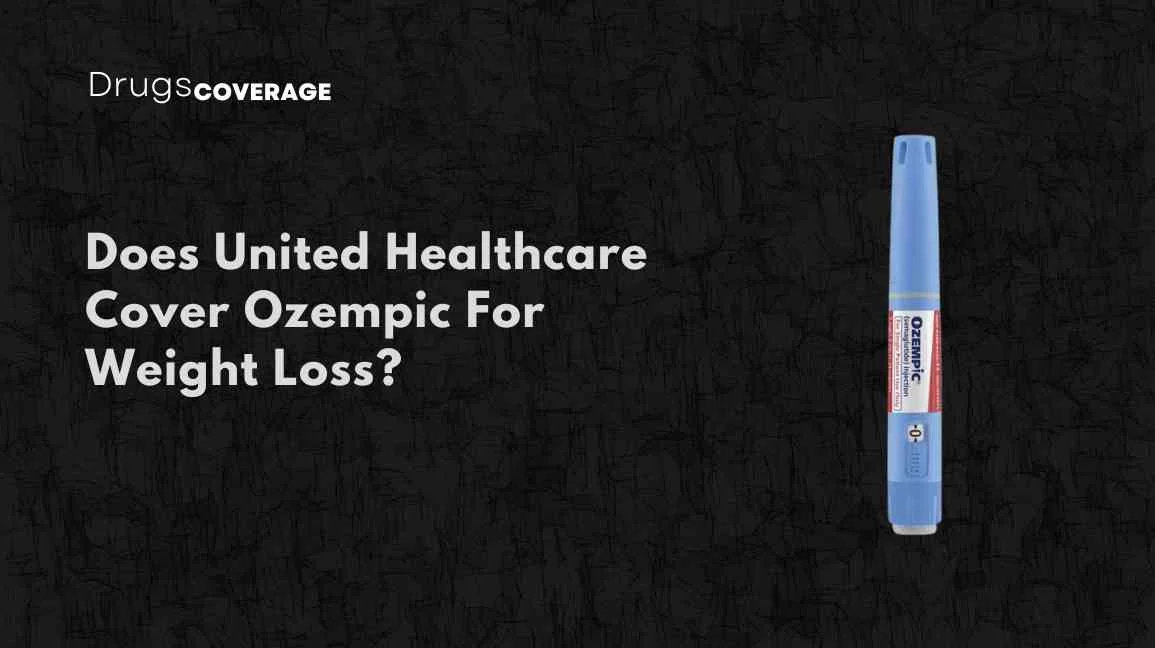Does United Healthcare Cover Ozempic for Weight Loss?

Understanding healthcare coverage can be tough, especially when you look for specific treatments like weight loss options. One such option that has gained popularity recently is the use of Ozempic for weight loss. But does UHC actually cover this drug for weight loss?
United Healthcare is one of the leading health insurance providers that offers a wide range of plans that cater to the varied needs of its members. To check if your plan covers Ozempic for weight loss, you’ll need to look into United Healthcare’s policy details, list of covered drugs, and any preapproval needed.
In today’s article, we’ll explore the coverage of Ozempic for weight loss by United Healthcare, so you can make an informed decision about your weight loss journey.
What is Ozempic?
Ozempic is a brand name for the medication semaglutide, which is mainly used to treat type 2 diabetes. It belongs to a class of drugs called GLP-1 receptor agonists.
These drugs work by mimicking the action of the GLP-1 hormone in the body, which is responsible for regulating blood sugar levels.
When you take Ozempic, it improves the release of insulin when blood sugar levels are high, decreases the amount of sugar the liver releases, and slows down digestion. This not only helps control blood sugar levels in people with diabetes, but it’s also great for weight loss by making you feel full, so you eat fewer calories.
Though not originally approved for weight management, the effectiveness of Ozempic in helping individuals lose weight has led to its off-label use in the context of weight loss programs.
Does United Healthcare Cover Ozempic?
Yes, United Healthcare does cover Ozempic but with certain conditions.
According to their policy details, UHC considers Ozempic as a medically necessary drug for the treatment of type 2 diabetes in adults. This means that if you have a diagnosis of type 2 diabetes, your UHC plan will most likely cover the cost of Ozempic. However, it is important to note that coverage may vary depending on the specifics of your plan.
Does UHC Cover Ozempic for Weight Loss?
Unfortunately, UnitedHealthcare’s prescription drug plans do not cover Ozempic for weight loss. This is due to a practice of only covering medications for uses approved by the Food and Drug Administration (FDA).
Off-label use, as it’s called when a medication is used for an unapproved use, is generally not covered under insurance plans, as they are deemed unproven and may also be potentially unsafe ffor that specific purpose.
Also Read: Does Kaiser Cover Ozempic for Weight Loss?
Eligibility Criteria for UHC
To be eligible for Ozempic coverage under United Healthcare, you must:
- Have a Diagnosis of Type 2 Diabetes: UHC covers Ozempic for members diagnosed with type 2 diabetes as it’s deemed medically necessary for this condition.
- Obtain a Prescription from a Healthcare Provider: Coverage is contingent on receiving a prescription from a licensed healthcare practitioner.
- Meet Any Plan-Specific Requirements: Some UHC plans might have additional prerequisites, like prior authorization or step therapy.
- Comply with Treatment Guidelines: Members may need to follow certain UHC guidelines on dosage and treatment duration to ensure coverage.
- Adhere to the Plan’s Network: UHC covers Ozempic when filled at a network pharmacy or through their mail-order program.
How to Verify Your Ozempic Coverage
To verify your Ozempic coverage under United Healthcare, follow these simple steps for a hassle-free process:
1. Check Your Insurance Card: Start by looking at your UHC insurance card. It has important info like your plan type and how to contact member services.
2 .Use Your Online Account: United Healthcare has a website for members. There, you can see your plan details, like which medications are covered.
3. Talk to Member Services: If you’re confused about your coverage, call UHC member services using the number on your insurance card. Have your plan ID ready and ask about Ozempic coverage for type 2 diabetes and any off-label use.
4. Ask Your Doctor: Your healthcare provider can help too. They know about insurance and can suggest options if Ozempic isn’t covered for weight loss.
5. Learn about Prior Authorization: Some meds, like Ozempic, need approval first. Your doctor will talk to UHC to explain why you need Ozempic. Ask your doctor to start this process if required.
By taking these steps, you can effectively determine your eligibility for Ozempic coverage under United Healthcare.
Factors That Determine the Coverage of Ozempic
There are a few factors that can affect the coverage of Ozempic under UHC, including:
- Plan Type: Depending on your plan type, your coverage for Ozempic may differ. For example, Medicare plans may have different rules than employer-sponsored plans.
- Formulary List: United Healthcare has a list of preferred medications called a formulary that they cover at a lower cost. If Ozempic is not listed on your plan’s formulary, you may have to pay the full cost out of pocket.
- Network Pharmacy: UHC plans require members to use network pharmacies for coverage. If you fill your Ozempic prescription at an out-of-network pharmacy, it may not be covered.
- Preapproval/Step Therapy: As mentioned above, some UHC plans may require preauthorization or step therapy before covering Ozempic. This means that you may have to try other medications first before being approved for Ozempic coverage.
- Medical Necessity: UHC considers Ozempic medically necessary only for the treatment of type 2 diabetes. If you are using Ozempic for weight loss, it may not be covered.
Alternatives of Ozempic for weight loss
If you’re looking for options other than Ozempic for weight loss, especially with coverage limits or if you prefer FDA-approved choices, there are a few alternatives worth considering.
- A notable mention is Wegovy™, also a GLP-1 receptor agonist, specifically approved by the FDA for weight management. Similar to Ozempic, Wegovy™ works by imitating the GLP-1 hormone, enhancing feelings of satiety, and reducing appetite, thereby assisting in weight loss.
- Another option is Liraglutide (brand name Saxenda®), which, like Ozempic and Wegovy™, is part of the GLP-1 receptor agonist family but designed specifically for weight management.
- For those looking for a non-injectable option, Orlistat (Xenical®/Alli®) is a weight loss pill that reduces the absorption of fats from the diet, thus lowering calorie intake.
Conclusion
In conclusion, UnitedHealthcare covers Ozempic for type 2 diabetes, but it’s important to know the details of your policy if you want to use it for weight loss. Learn about the rules, what your plan requires, and how to check if it’s covered. If Ozempic isn’t covered for weight loss, you can go for other options like Wegovy™, Liraglutide, and Orlistat. These work similarly to Ozempic and are FDA approved. Talk to your healthcare provider and insurance to make the best choices for your health.
FAQ
Does UnitedHealthcare cover Semaglutide for weight loss?
UnitedHealthcare generally does not cover medications like Semaglutide for weight loss unless they are specifically approved for that purpose and meet the necessary criteria outlined in your health plan. If you have type 2 diabetes, Semaglutide may be covered for that condition. However, it’s important to check with your insurance provider for specific coverage details.
Does UnitedHealthcare cover GLP-1 for weight loss?
UnitedHealthcare provides coverage for GLP-1 receptor agonists, including medications like Semaglutide, mainly for the treatment of type 2 diabetes. While these meds may help with weight loss, coverage for weight management depends on FDA approval and health plan criteria.
The majority (80%) of UnitedHealthcare’s spending on GLP-1 drugs is for type 2 diabetes treatment, with a smaller portion(20%) allocated to weight loss. For detailed coverage information, you should consult your plan documents or contact member services.
Is Ozempic covered by Medicare?
Yes, Ozempic is usually included in about 93% of Medicare plans, but the coverage and expenses could differ based on your particular plan. Make sure to reach out to your Medicare prescription drug plan for details about coverage and cost-sharing for Ozempic before filling a prescription.




